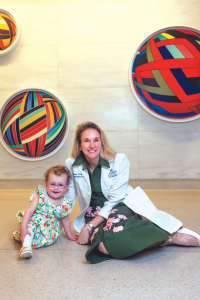Johns Hopkins UniversityEst. 1876
America’s First Research University
“Mission critical.” That was how pediatric ophthalmologist Courtney Kraus, MD, described the condition of Bernadette “Bernie” Cowell Murray when Kraus examined the 7-day-old newborn in October 2022.
Though it was intimidating news, Bernie’s parents, Maggie Cowell and Joe Murray, were relieved. Their baby’s first days had contained enough confusion and worry to last a lifetime. At birth, Bernie’s eyes looked different. Though her eyes were enlarged and cloudy, Bernie was released from the hospital where Cowell had given birth without a diagnosis and with no guidance for next steps. When Cowell contacted the Wilmer Eye Institute, she did so without knowing which specialist to see.

Fortunately, Cody Richardson, MD, knew right away what the problem was: congenital glaucoma. He referred them to Kraus, a pediatric glaucoma specialist.
“Dr. Kraus met with us and said, ‘Good news, bad news. We know what it is. It will be a long series of procedures, but we’ll get you right in. Can you do surgery tomorrow morning?’ And we said, yes, of course,” says Cowell.
Congenital glaucoma requires urgent action for two reasons: First, eye pressure builds quickly in infants, which damages the optic nerve and causes vision loss. Second, children with congenital glaucoma have cloudy corneas that need to be cleared as soon as possible.
“The brain relies on having a clear visual image hitting the retinas and then transmission to the visual cortex to develop vision. If your brain can’t see during the critical first period of life, you don’t develop good vision,” Kraus explains. “The problem with congenital glaucoma is you’re born with a very cloudy cornea, so everything that gets into your eye is scattered and hazy. The goal of surgery is to lower the eye pressure, which clears the cornea and starts you on the path to visual development.
Bernie had her first surgery with Jefferson Doyle, MBBCh, MD, BSPH ’04 (MHS), Med ’15 (PhD), the Andreas C. Dracopoulos and Daniel Finkelstein, M.D. Rising Professor of Ophthalmology. Afterward, Bernie’s right eye cleared up almost immediately. Her left eye lagged behind, but, by the fall of 2023, Kraus was happy with its progress.
“The glaucoma at the moment is well controlled due to Dr. Kraus’ heroic efforts,” says Cowell. “Bernie is doing awesome. She even started mainstream day care the week of her first birthday, which we did not think was possible at birth.”

Over the past 18 months, Bernie has had eight procedures at Wilmer, most of them with Kraus. “When you have a child with congenital glaucoma, you usually see them more often than their pediatrician does. I’ve seen Bernie meet almost every single motor, physical and developmental milestone in her first year of life,” says Kraus.
This bond inspired Cowell, Murray, and their families to celebrate Bernie’s first birthday by asking for donations to Wilmer from friends and family in Bernie’s name. “There’s no way to put into words how thankful we are to be this close to Wilmer, to be in the excellent care of these world-renowned doctors,” says Cowell. “We thought this might be a small way to show our gratitude and also to support Courtney’s work.”
Kraus was surprised and moved by the Murray and Cowell family fundraiser in support of her work.
“One of the things I love about my job are these moments impacting kids early in their life and being a part of their lives as they grow and develop,” says Kraus. “Seeing someone recognize the extra effort, the care and the concern, and that I’m really with them in the struggle — that’s what this gift says to me.”
Kraus, Doyle, and Bo Wang, MD, PhD, who recently joined the Wilmer faculty, constitute what Kraus calls the Pediatric Anterior Segment Team within Wilmer’s pediatric division.
It is rare for an academic medical center to have an entire team focused on pediatric anterior segment (or front-of-the-eye) conditions, explains Kraus. “The depth of our team means that taking care of children like Bernie comes with the ability to move very quickly and with enhanced options when we have children who have these time-sensitive conditions,” she says.
For families, that one-stop team approach means fewer appointments to keep track of and less chance of important information dropping through the cracks. Beyond providing convenience, this continuity of care often creates strong bonds between doctors and families as well.
“We’re so connected in this early, very scary period of their kids’ lives. I can’t say how much it makes me feel privileged to be a person who makes parents feel a little less scared,” says Kraus.
This story was first published in the Summer 2024 edition of Wilmer. Read the full story.
Topics: Faculty and Staff, Friends of Johns Hopkins Medicine, Wilmer Eye Institute, Promote and Protect Health